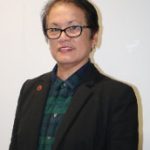Ontario Liberal front-runner to push for improved foreign credential recognition
Ontario Liberal front-runner to push for improved foreign credential recognition

Steven Del Duca (centre) at press conference (Photos supplied)
Provincial Liberal Leader Candidate Steven Del Duca
By Irish Mae Silvestre
The Philippine Reporter
“I will take action… to ensure valuable skills are not being lost” – Steven Del Duca
As demand for skilled workers increases, immigrants continue to face barriers when it comes to having their foreign credentials assessed and recognized.
According to Ontario Liberal Party front-runner, Steven Del Duca, immigrants deserve a more efficient process when it comes to assessing their credentials. “Tackling this issue is important to ensuring that everyone has a chance to join the middle class,” he said in an email interview with The Philippine Reporter. “This is why I will take action to expedite and improve the foreign credential recognition processes to ensure valuable skills are not being lost.”
Working Through Barriers

Vida Cruz, CPA, Association of Filipino Canadian Accountants (AFCA) past President (2018-2019)
For immigrants, efforts to find work in their fields are hampered by a myriad of issues.
In 2009, the Community Alliance for Social Justice and CERIS (Centre of Excellence for Research on Immigration and Settlement) published a paper titled ‘Explaining the Deprofessionalized Filipino: Why Immigrants Get Low-Paying Jobs in Toronto.’ The research showed that a combination of strict assessment requirements, expensive exams or training, and financial pressure often force professionals into “survival jobs.”
Often, Filipino immigrants sometimes end up “working two or three jobs, leaving no free time in which to find better work.”
Vida Cruz, CPA, sees this first-hand as the immediate past President (2018-2019) of the Association of Filipino Canadian Accountants (AFCA). “Once a Filipino is in a survival job, they stick to it and you can’t blame them,” says Cruz. “You have to pay for rent, you have to pay for everything. And the fees per subject are exorbitant at $500 each. It’s not a joke.”
While she believes that the requirements for accountants are straightforward, immigrants face other obstacles. “There’s the language barrier, public speaking, and having to take full-time classes while you’re employed full-time,” she said. “That’s what our association helps with. We give them training on soft skills and if they want to continue their professional education.”
A Shortage of Resources
When Arvin Aguba moved to Canada in 2011, he said that it was a struggle just to find the right information. Aguba, a professional certified engineer and master electrician, was already an experienced engineer in the Philippines and in Singapore prior to moving to Toronto. Yet, when he arrived, all the courses and exams he needed to take felt like he was starting “from the very beginning again.”
“For older people like me who finished university ten to fifteen years ago how can you expect us to remember what we learned at university?” he asked. “Because what you learned at university is not applicable in real life; you can use maybe fifty percent of what you’ve learned.”
With fields like engineering requiring multiple exams – and in some cases, even one year of Canadian experience – there’s an ongoing sense of frustration, especially for new immigrants with in-demand skills. “If the government of Canada already determined that Canada needs them, why can’t they work directly in their field?” asked Aguba. He also stated that the government can help immigrants by providing funding for bridging programs to help ease the transition.
There’s also a need for more standardized requirements regardless of which country an immigrant comes from. “Why won’t they recognize CPA Philippines when Australia is recognized?” said Cruz. “That’s an ongoing issue, which hasn’t been solved yet.”
Del Duca acknowledged that the current system and the red tape forces people to “spend years repeating education they already have, which is not a possible option for many.” In a statement, he outlined his twelve-month plan to tackle these issues:
• Ontario will no longer have a cap on the number of new professionals with foreign credentials joining the workforce;
• Professional associations and regulators are expected to produce standardized guidelines and duration of the assessment processes;
• Funding will be provided for pilot programs to test new models of foreign credential recognition programs, with a focus on high growth sectors and research and innovation growth.
“As the son of two immigrants, I understand that Ontario is not reaching its full potential when those with specialized training from abroad are unable to pursue their careers in line with their skills and experience,” said Del Duca.
For Cruz, it’s high time that professionals are given the opportunity to utilize and even improve their skills. “We’re all professionals when we leave the Philippines,” she said. “If we can upgrade the professionalism of each individual or each Filipino, I think that’s really an edge for us.”
Comments (0)